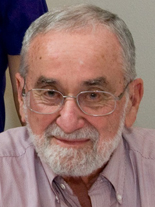Mike Atkin
Biography
Mike Atkin taught science for seven years in New York elementary and secondary schools. He joined the faculty of the University of Illinois at Urbana-Champaign in science education in 1955 and moved to the Stanford University faculty in 1979. At both universities, he also was Dean of Education: from 1970 to 1979 at Illinois and from 1979 to 1986 at Stanford.
He has chaired the Education Section of the American Association for the Advancement of Science and served as a consultant on education to the Organization for Economic Cooperation and Development (OECD) in Paris. He is a National Associate of the National Academies of Science (NAS), where he has been a member of several boards and committees, including the Mathematical Sciences Education Board and the National Committee on Science Education Standards. He also chaired the NAS/National Research Council Committee on Science Education K-12, the Committee on Classroom Assessment and the National Science Education Standards, and the Committee on Assessment in Support of Instruction and Learning. He also chaired the Committee on Science and Engineering Education of Sigma Xi, the honorary scientific research society, and was vice-chair of the Advisory Committee for Science and Engineering Education at the National Science Foundation. During 1986-87, he served as Senior Advisor to the Education Directorate at NSF. In the 1960s, he directed one of the first two NSF-supported curriculum projects for students below the high school level, the University of Illinois Astronomy Project.
His recent major projects include (1) principal investigator for an NSF-supported research project on everyday assessment in science classrooms; (2) co-chair of the International Steering Committee of a 13-country study of innovations in science, mathematics, and technology education conducted under the auspices of the OECD; (3) ongoing study of local, inter-institutional alliances to improve science education that bring school districts into collaborative relationships with government laboratories, universities, industry, and museums; (4) evaluation of an NSF-supported gender-equity project linking the University of California at San Francisco (UCSF) with the San Francisco Unified School District (SFUSD); and (5) evaluation of an NIH-supported UCSF/SFUSD project that focuses on improving science education for elementary-school students who are learning English.
General research and theoretical interests include: (a) improvement of the science curriculum in elementary and secondary schools; (b) teacher-initiated inquiry, especially action research; (c) practical reasoning in teachers and in children; (d) case methods in educational research; (e) improvement of assessments by teachers, both to foster learning and for purposes of accountability; (f) evaluation of educational programs; (g) development of policies that accord classroom teachers greater influence in determining the educational policy and research agenda; (h) teacher professional development; and (i) fostering perspectives from the humanities in all aspects of the scholarly study of education.

